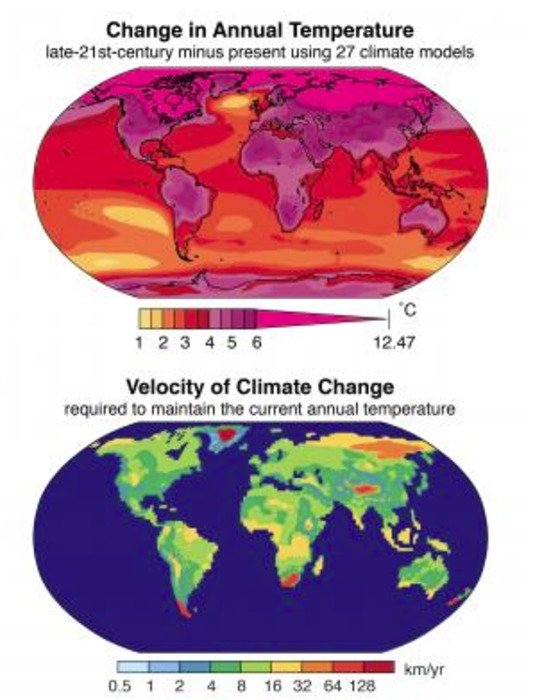Top: The change in annual temperature projected for the late 21st century using simulations from 27 global climate models. Bottom: The velocity of climate change required to maintain the current annual temperature should the late-21st-century climate change occur. Credit: Noah Diffenbaugh
PALO ALTO, Calif., Aug. 1 (UPI) -- Climate change is occurring faster now --10 times faster -- than at any time in the past 65 million years, researchers in the United States say.
If the trend of change maintains its current rapid pace, it will place significant stress on global terrestrial ecosystems and many species will need to make behavioral, evolutionary or geographic adaptations to survive, they said.
That's the conclusion reached after a review of climate research by Noah Diffenbaugh and Chris Field, both senior fellows at Stanford University's Woods Institute for the Environment in California.
"We know from past changes that ecosystems have responded to a few degrees of global temperature change over thousands of years," Diffenbaugh said. "But the unprecedented trajectory that we're on now is forcing that change to occur over decades. That's orders of magnitude faster, and we're already seeing that some species are challenged by that rate of change."
Although some of the changes the planet will experience in the next few decades are already "baked into the system," the researchers said, how different the climate looks at the end of the 21st century would depend largely on how humans respond.
"There are two key differences for ecosystems in the coming decades compared with the geologic past," Diffenbaugh said in a Stanford release Thursday. "One is the rapid pace of modern climate change. The other is that today there are multiple human stressors that were not present 55 million years ago, such as urbanization and air and water pollution."
Some climate changes will be unavoidable because humans have already emitted large quantities of greenhouse gases, the impact of which will last for decades even if emission levels are controlled, he said.
"There is already some inertia in place," Diffenbaugh said. "If every new power plant or factory in the world produced zero emissions, we'd still see impact from the existing infrastructure, and from gases already released."















